Oil prices continued to drop on February 18, and are headed for a weekly fall due to the prospect of a possible supply disruption. The extra supply from Iran returning to the market could face issues arising from the potential Russian invasion of Ukraine.
Brent crude futures fell 65 cents, or 0.7 percent, to $92.32 a barrel, extending a 1.9 percent drop from the previous session. US West Texas Intermediate (WTI) crude futures shed 71 cents, dropping to $91.05 a barrel, after sliding 2 percent in the previous session. The two benchmarks contracted their highest level since September 2014 on February 14 but were headed for their first weekly fall in nine weeks. The fall comes amid reports of a possible ongoing deal to revive Iran’s 2015 nuclear agreement with world powers. This means that a draft accord will be chalked up to outline a sequence of steps that would eventually lead to granting waivers on oil sanctions. If the deal comes through it would bring about 1 million barrels a day of oil back to the market, however, the timing remains unclear.
China, France, Germany, the European Union, Iran, Russia, the UK and the US are still negotiating the details of the draft accord. The broad objective of the accord is to lift sanctions on Iran including the ones that affected its oil sales. In exchange, restrictions will be placed on its nuclear activities, which would delay the time to produce enough enriched uranium for an atomic bomb if it chose to.
“The downward pressure on crude from the prospect of a deal is likely to sustain… unless the parties end the latest round of talks still in a deadlock,” said Vandana Hari, founder of oil market analysis provider Vanda Insights. Hari further added that the Ukraine standoff has furthered fears that premium in crude is starting to fray at the edges.
Read more: US Offers No Concessions To Russian Demands Over Ukraine And NATO
Analysts do not expect oil prices to fall further in the near future. This is because the Organization of the Petroleum Exporting Countries and allies (OPEC+) is currently facing issues in meeting their production targets. “Oil markets are vulnerable to supply disruptions given global oil stockpiles are tracking near seven-year lows and as OPEC+ spare capacity comes into question given disappointing OPEC+ supply growth,” said Commonwealth Bank (CBA) analyst Vivek Dhar.
According to CBA, the recovery witnessed in the air travel and road traffic will see Brent holding in the $90 to $100 a barrel range in the short term and reaching $100 “quite easily” if an imminent Russian invasion takes place.









